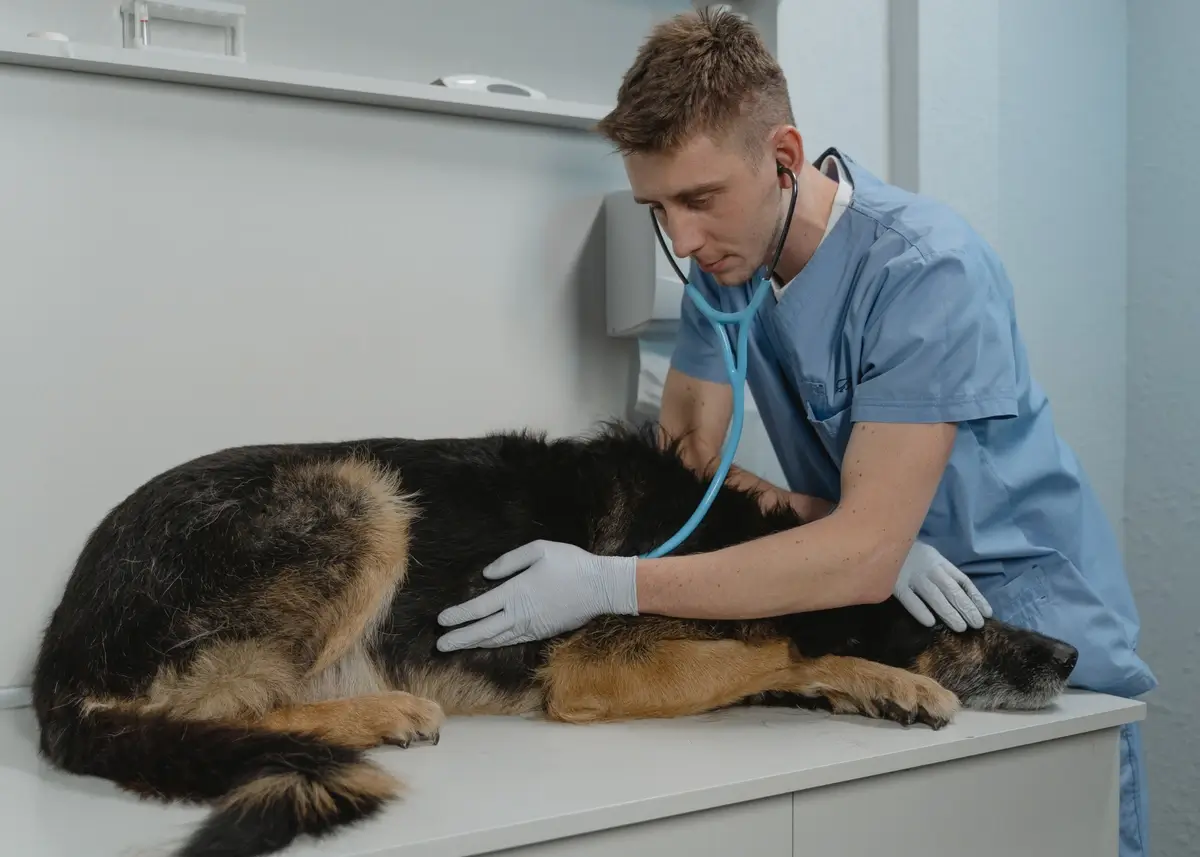You’ve heard the saying “sick as a dog,” but what’s the significance of that particular phrase? Well, none of us want to find out! Puppies can get illnesses just like human infants and toddlers.
The key to recognizing common puppy ailments is to pay close attention to how your puppy behaves normally and act right away when something is off.
When you bring home a new puppy, you’ll want to be as knowledgeable as possible in case you run across common puppy illnesses. While learning about parasites and how diseases are spread can make you squeamish, it is imperative to be educated no matter how uncomfortable it may be for the safety and well-being of your precious pup.
We are all committed to the health of your puppy at Pawrade. We have a puppy first approach and want you to have as much information as possible so you can enjoy your happy & healthy puppy.
How to Recognize and Treat These Common Puppy Illnesses
While some of the most common puppy illnesses can be devastating, the good news is most are preventable or lessened by fully vaccinating your puppy, providing up-to-date preventative medicines for flea, tick, and heartworm, and by maintaining a clean and sanitary living environment.
We know you’re eager to show off your new puppy with a trip out and about, but rethink and hold off until you get your puppy all the rounds of required vaccinations after 16 weeks old. Several of these diseases can spread in public places like the dog park, the pet store, a lunch date, or a group of friends. No one wants a fun time to cause your vulnerable puppy to accidentally contract a life-threatening virus.
You’ll find that puppy illnesses often share the same symptoms such as lethargy, vomiting, and diarrhea. However, understanding what can make a puppy sick can help you determine what illness your puppy might be facing and if it’s a cause for concern to get the best results.
Parvovirus
The highly contagious canine parvovirus can wreak havoc on a vulnerable puppy, mostly affecting the small intestines, bone marrow, stomach, lymphatic system, heart, and other areas. The disease can break down the body’s ability to fight other complications, leading to secondary infections. There is no cure for parvo, and it can be a fatal disease. Parvo spreads via direct contact with an infected puppy or through indirect contact with contaminated items. Parvo can even live in the ground!
Detecting parvo
You may suspect parvo if your puppy starts having bloody, discolored, or foul-smelling diarrhea, fever, vomiting, lethargy, weight loss, dehydration, and other causes of concern. Your puppy will get very sick very quickly!
A veterinarian can administer a few tests to detect parvo: the SNAP test and a RealPCR through IDEXX. If a SNAP test comes back positive for parvo, it’s still required to perform a RealPCR through IDEXX because parvo can share many characteristics of other diseases and conditions such as hypoglycemia. You will want to make absolutely sure your puppy has parvo to avoid unnecessary, expensive treatment and to receive the correct medications.
You may be relieved to learn parvo is absolutely preventable by maintaining a current vaccination schedule and waiting to take your puppy out and about until they’re fully vaccinated. Supervise your puppy to make sure they don’t eat, drink, or lick anything off the ground because parvo can also live in soil. In addition, try your best to make sure other dogs your puppy is around are fully vaccinated.
Distemper
Another extremely serious, contagious, and perhaps fatal puppy illness is distemper. This disease is caused by a virus related to measles and can manifest itself in multiple body systems, especially attacking the puppy’s central nervous system.
Distemper is spread through the placenta of an infected mother, the air, or direct contact with infected animals or objects. Symptoms can be increasingly severe, starting with fever, eye and nasal discharge, or coughing and quickly moving to brain and spinal cord inflammation, paralysis, seizures, and death.
While there is no cure for this awful disease that can strike puppies, the good news is every puppy should be vaccinated against it, greatly reducing the effects of a distemper infection.
Intestinal Parasites
Did you know that all puppies carry parasites? The difference between harmful and harmless parasites is if the particular parasite is alive and active or not. Parasites do not go away on their own and must be treated right away before they cause serious health complications.
Heartworm, roundworms, hookworms, and whipworms
A variety of worm parasites can affect puppies and cause serious problems if left untreated. Dogs cannot get pinworms, as those only like human hosts. However, puppies can contract other worm parasites by eating infected feces or soil. Worms can happen anytime, such as during the transition from mama’s milk to starting solid foods.
The most common worm you may have heard of as a threat to puppies is a heartworm infection, a serious disease that can cause awful problems such as heart failure, severe lung disease and other organ damage, and even death.
It all starts with the bite from a mosquito carrying infective heartworm larvae (called Dirofilaria immitis), which make their way to the heart, lungs, and associated blood vessels of your puppy. The heartworms complete their life cycle in the bloodstream and look like thin strands of cooked spaghetti.
You’ll be happy to find out that heartworm can be easily prevented with regular heartworm prevention medicine. Your licensed veterinarian will have a schedule to follow to ensure your puppy is always up-to-date.
Other worm infections are similar in that they enter the body through infected soil or waste, need a host to reach maturity, cycle through the body, and can complete the cycle back to where we began with infected waste or soil. Worms should be treated right away with special medication.
Fleas and ticks
Did you know a female flea will lay at least 10, if not more, female eggs a day capable of producing about 20,000 new fleas in 60 days? Or that there are more than 850 species of ticks on the planet with 90 species living in the US? Yikes! Knowing these facts can help you protect your puppy year-round from fleas and ticks.
Fleas and ticks can cause a variety of detrimental conditions. Flea bites are painful and itchy, and fleas can carry flea-born typhus, tapeworm, and even the plague! Ticks can infect your dog with Lyme disease, Rocky Mountain Spotted Fever, and a whole host of other infections.
Sometimes, it can be pretty obvious your dog has fleas. Look for scratching or irritated skin areas and brownish-black crusty spots of dried blood and excrement called “flea dirt.” Embedded ticks will swell like a skin tag and will either be in an obvious spot or buried in paw and ear folds.
If you find fleas, treat your dog right away with medication and specialized shampoo. You’ll also need to treat your home with diatomaceous earth or commercial flea bombs to not only kill the live fleas but also their eggs as well. Fleas can bite humans and leave nasty welts as well as jump from host to host, so watch out for bites on other pets and members of your household.
If you find a tick, be sure not to squeeze it because it can release more toxins while fighting to stay. Instead, drown it in Listerine or rubbing alcohol or use fine-point tweezers or a safe tick remover tool to gently release the mouthparts. You can put the tick’s body in a sealed plastic baggie and place it in the freezer until you’re ready to get it tested for diseases if you’d like.
A comprehensive 3-in-1 monthly medication can prevent flea, tick, and heartworm issues year-round. Flea and tick collars release a repellent chemical as constant protection that can be useful tools in the fight against fleas and ticks.
Dogs often get infested with fleas and ticks through contact with nature, other animals, pets, or wildlife. Finding the right treatment for your home and yard to get rid of fleas and ticks will help protect your dog in addition to preventative medicines.
Giardiasis
Giardiasis is an infection of the small intestine caused by the microscopic protozoan parasite Giardia duodenalis. A puppy becomes infected with giardia by ingesting the cyst stage of the parasite via contaminated feces, soil, or water, where the newly-transformed adult parasite feeds on the intestinal wall. The puppy can pass on the parasite cysts through its waste, completing the cycle.
Puppies are especially vulnerable because their immune systems are not yet fully developed. You’ll be able to suspect giardia if you notice foul-smelling, fatty diarrhea, weight loss, lethargy, and dehydration. Your veterinarian will recognize giardia and treat it appropriately.
Cryptosporidiosis
Gastroenteritis and diarrhea can be caused by another parasitic infection called cryptosporidiosis. Ingesting contaminated food, water, or feces can cause lethargy, fever, weakness, and even organ failure if not properly treated. A high-fiber diet, antibiotics, and other supportive therapies can help your puppy get rid of this parasite in 3-12 or so days.
Coccidiosis
An intestinal tract infection called coccidiosis occurs when puppies ingest a single-celled organism (protozoa) called coccidia found in contaminated dog feces and soil. Coccidiosis is highly contagious and can live in the ground for up to a year! Symptoms are similar to other parasites, so pay attention to your dog’s bathroom habits and other physical signs of a parasite infection.
Kennel Cough
Infectious tracheobronchitis, commonly known as kennel cough, is an airborne bacterial or viral infection transmitted to puppies in any social setting, not just a kennel. Reputable boarding facilities and other social settings like classes or doggy daycares will require current bordetella vaccines before accepting reservations.
You’ll know if your puppy has a possible kennel cough if you notice retching or a loud, deep, productive, hoarse bark, lethargy, sneezing, a runny nose, decreased appetite, or fever.
Even though your puppy may be up to date on the Bordetella (kennel cough) vaccine, they can still contract the infection, much like humans can still get influenza even if they had a flu shot that season. Luckily, this affliction is rarely life-threatening and can be treated with rest and medication. Quick treatment is needed to prevent pneumonia.
Dog Flu
Just like humans, puppies can get the flu. But before you stock up on chicken noodle soup and lots of fluids, your puppy doesn’t catch the same exact flu strains as humans, and your puppy can’t infect humans if she has canine flu.
Canine influenza virus, specifically the H3N8 or H3N2 strains, is endemic in dogs and is spread through respiratory droplets and contact with contaminated items. Your puppy may have canine influenza if she is sneezing, coughing, running a fever, experiencing a runny nose, lethargy, a reduced appetite, or eye discharge. If your puppy catches dog flu, most cases are mild, and symptoms can range from very few symptoms at all to severe pneumonia caused by complications. Speak with your vet to see if a canine flu vaccine is right for your puppy.
Hypoglycemia
Hypoglycemia happens when your puppy’s blood sugar is low due to not eating enough or for other serious reasons such as tumors or cancers. Because symptoms of hypoglycemia can look like other serious diseases like parvo with general lethargy, fainting, vomiting, or even seizures, a quick call to the vet can help you monitor your puppy’s condition or decide if you need to come in for a blood sugar/insulin check.
Some smaller dog breeds are more susceptible. You’ll be glad to know that hypoglycemia is easy to prevent by keeping up with providing a high-quality diet fed at the right times for your puppy’s nutritional needs. Some vets may even recommend up to 6 times a day. Feeding special supplements and keeping some food such as boiled chicken, eggs, or rice on hand will help maintain steady blood sugar levels.
Which Illnesses Can Humans Give to Dogs? Can Dogs Give Illnesses to Humans?
You may be wondering if dogs and humans can pass illnesses or diseases among us. While some illnesses are specific to just humans or canines, others can be transmitted from a puppy to a human or from a human to a puppy via contaminated air in the environment, equipment, human skin, clothing, and waste such as feces and urine.
Illnesses humans can pass to dogs whether directly or to other dogs can be distemper, ringworm, tuberculosis, parvovirus, and bacterial infections like salmonellosis and MRSA.
In addition, some dogs may pass along illnesses to humans, including bacterial infections like leptospirosis, salmonella, rabies, and ringworm.
When in Doubt, Call Your Vet!
If you ever have any questions about your puppy’s health, always make a quick call to your veterinarian. While we provide an overview of common puppy illnesses, we cannot recommend an exact treatment protocol. Only your licensed veterinarian is qualified to give medical advice specific to your puppy’s needs.
Even if it’s just a bit of unexplained lethargy, vomiting, or diarrhea, you’ll have peace of mind knowing you are a responsible puppy owner who promptly responds to any behavior deviating from the norm.
Find a Healthy Puppy at Pawrade
When you buy a puppy through Pawrade, every effort is taken to ensure your puppy is happy and healthy. Our comprehensive Health Guarantee protects both breeder and new puppy parents by outlining the responsibilities of both parties regarding your puppy’s health.
When your puppy arrives from a Pawrade breeder, your puppy has been vaccinated for parvo and other common puppy illnesses and comes with a Health Certificate from a USDA-licensed veterinarian.
Pawrade is proud to offer happy, healthy puppies for any lifestyle from hand-picked, pre-screened breeders who adhere to the cleanest of standards. Search our available puppies for sale to find your new best friend!
**Pawrade always recommends checking with a licensed veterinarian for any health-related issue. We do not claim to be professionals; rather, we offer advice about your dog’s health with an informative, educational purpose.





